home > Insights by FWB > Redeeming William Cowper
 William Cowper is considered one of England’s finest poets and hymn writers. But he suffered horribly from depression, or as it was referred to – melancholy. He was befriended by John Newton (the composer of Amazing Grace) and together they held a weekly hymn service in Newton’s parish church at Olney where they introduced a new hymn each week! This resulted in the ‘Olney Hymnal’ (1779). But Cowper’s melancholy frequently got the better of him. Newton’s patience during his friend’s moments of anguish was extraordinary. He said that in all the years he and Cowper were friends there were some years where Cowper only enjoyed clarity of mind 2 or 3 days in that year – but in those days, Cowper produced hymns which were among the most profound hymns in English Christendom.
William Cowper is considered one of England’s finest poets and hymn writers. But he suffered horribly from depression, or as it was referred to – melancholy. He was befriended by John Newton (the composer of Amazing Grace) and together they held a weekly hymn service in Newton’s parish church at Olney where they introduced a new hymn each week! This resulted in the ‘Olney Hymnal’ (1779). But Cowper’s melancholy frequently got the better of him. Newton’s patience during his friend’s moments of anguish was extraordinary. He said that in all the years he and Cowper were friends there were some years where Cowper only enjoyed clarity of mind 2 or 3 days in that year – but in those days, Cowper produced hymns which were among the most profound hymns in English Christendom.
Heal us Immanuel hear our prayer
We wait to feel Thy touch
Deep-wounded souls to Thee repair
And Saviour we are such
–William Cowper
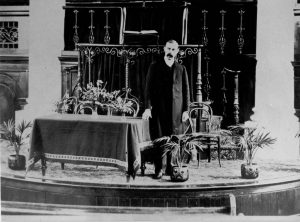
FWB on the Hobart Baptist dias
When F.W. Boreham amazed himself by announcing to his evening congregation at Hobart that the following Sunday evening he would be commencing a fortnightly series on Texts That Made History, beginning with Martin Luther’s text, what followed was his introduction to the world as a biographical preacher. Although he had written a dedicated biography earlier (1911) on George Augustus Selwyn (the only biography which FWB would write) this series, which proved to be his most popular, saw him embark on a course of biographical sermons which set him apart as the story-telling preacher. Each of these sermons sounded so much like a story that when they appeared in the columns of major metropolitan newspapers, their appeal extended way beyond the bounds of stained glass windows. But Boreham’s motive wasn’t just to tell an interesting biographical story.
“Some think that Boreham depended too much on storytelling for the content of his sermons. He was not an expositor if an expositor must take an extended Scripture passage and explain it in detail. Instead, he excelled in taking a key verse and making it come alive through the life of his chosen subject in history of literature. The churches he served grew and thrived on such preaching and his strong evangelistic emphasis.”
Austin B. Tucker, ‘The Preacher as Storyteller: The Power of Narrative in the Pulpit’, 2008, p.173.
EVERLASTINGS
F.W. Boreham’s original sermon series on Texts That Made History was eventually turned into a book called, A Bunch Of Everlastings. It was a risky departure for Boreham who had been producing what had proven to be very popular collections of essays. These books, The Luggage of Life, Mountains In The Mist, Mushrooms On The Moor, and The Other Side Of The Hill, certainly had romantic story-telling elements within them where FWB wistfully reflected on his Mosgiel pastorate. But A Bunch Of Everlastings was something altogether different.
It occurred to me that this series might be made into a book or even a series of books. But my previous seven books, starting with The Luggage Of Life, were a collection of essays with which my readers had grown accustomed to my style of essay writing. Such a series of biographical sketches would be something quite foreign to my readers. I therefore cablegrammed Dr. Sharp, who succeeded the Reverend C. H, Kelly, at Epworth Press, seeking his advice.
Excerpt from Navigating Strange Seas
On a recent trip to Western Australia, Frank had admired the native wildflowers which when pressed would maintain their bright colours for what seemed like forever. These flowers were known as ‘everlastings’. But since the Scriptures declare that “the grass withers and the flowers fade”, F.W. Boreham got the idea that the real ‘everlastings’ were lives changed eternally by the Everlasting Word of God. Four months after sending the cablegram to Epworth Press, FWB received a response from Dr. Sharp: “Send Everlastings Immediately.”
Boreham sent off the manuscript with the dedication –
At the feet of those three elect ladies,
The churches at Mosgiel, Hobart, and Armadale,
I desire, with the deepest affection and respect,
To lay this Bunch of Everlastings
T. Howard Crago, THE STORY OF F.W. BOREHAM, 1961, pg. 179
.
TEXTS THAT MADE HISTORY
What began as an interesting sermon series idea which might have involved a couple of dozen historic figures transformed by a text of Scripture, soon grew to become a 125 part series which would be published in 5 books. These books were published between 1920 to 1928: A Bunch of Everlastings (1920), A Handful Of Stars (1922), A Casket of Cameos (1924), A Faggot Of Torches (1926), and, A Temple Of Topaz (1928). Boreham described this series as by far his most fruitful and enjoyable.
After FWB originally preached this series in Hobart, he reworked it for Armadale. This involved visiting the State Library and spending hours upon hours researching each character. Crago tells us-
Boreham spent hundreds of hours poring over biographies saturating himself in what made these people into heroes. Library staff became so acquainted with him that one of them said – ‘it was not usual for Mr. Boreham to spend a whole morning ascertaining the precise colour of George Foxe’s eyes or the exact shade of Hugh Latimer’s hair.’
.
RESEARCHING WILLIAM COWPER
What is particularly interesting about this series is the list of people originally selected by Boreham. Most of them were heroic or famous – leaders in society. But there is one included who serves as a beautiful example of how F.W. Boreham saw through his eyes rather than with his eyes. William Cowper (pronounced ‘Cooper’) was a troubled poet and hymn writer. Many in Cowper’s day dismissed him as a lunatic and a poor example of a Christian. He unsuccessfully attempted to take his life several times. In his later years he was confined to a Lunatic Asylum. These were hardly the ideal traits of a heroic Christian leader!
Yet Boreham particularly went out of his way to get acquainted with and befriend Mr Cowper. Among the collection of Dr. Boreham’s books given to me by his family is FWB’s copy of Goldwin Smith’s biography of William Cowper.
Inside FWB’s personal copy of Goldwin Smith’s book we soon discover just how hard FWB worked to get to know his subjects. He has underlined certain sentences with blue pencil, others with a red pencil and still others with a grey lead pencil. In the margin he has written notes. Then folded neatly within its pages are the various incarnations of FWB’s attempts to introduce different audiences – Hobart Mercury readers, Melbourne Age readers, Australian Christian World readers, The Australian Baptist readers, to a side of William Cowper they may never have met.
Boreham introduces us, not to the deranged suicidal Cowper whose life was marred by controversy, but as the Gospel themselves do when introducing us to our Saviour, to a young boy. We are immediately told why we should pity this frail lad in his opening paragraph on Cowper.
Have a good look at him, this shy, shuddering, frail little fellow of six, for rough hands are waiting to hustle him on to the coach and to pack him off to a distant boarding-school! He is a quivering little bundle of nerves; slight of figure; with pale, pinched face, and eyes swollen with chronic inflammation. He starts at every sound in the daytime, and throws the bedclothes over his head at night that he may not be scared to death by the ghostly shadows that flit across the wall. His mother, his sole source of comfort, has just died : that is why he is being sent away from home. The memory of her was ever afterwards the one star that illumined his dark sky. Late in his life, a picture of her was presented to him ; and his ecstasy knew no bounds. ‘The world,’ he wrote to the giver, ‘could not have furnished you with a present so acceptable to me as the picture which you have so kindly sent me. I received it the night before last, and received it with a trepidation of nerves and spirits somewhat akin to what I should have felt had its dear original presented herself to my embrace. I kissed it and hung it where it is the last object which I see at night, and the first on which I open my eyes in the morning. Her memory is to me dear beyond expression.’
Two things should impress anyone about FW Boreham’s treatment of William Cowper. Firstly, he treats Cowper pastorally. Boreham is not writing as a historian – or even as a biographer – but as a pastor. Pastors love people despite their faults and shortcomings. Biographers and historians are rarely so gracious. Pastors interpret people and make allowances for them. Biographers rarely show such kindness. Pastors serve as agents of the Redeemer and strive to redeem their people. Historians care little for redeeming anyone.
Secondly, Boreham was thorough. Each essay was the result of much reading. Behind each essay in the Texts That Made History series were several major biographies and many many articles by other writers. For example, as far as I can tell from examining FWB’s copy of Goldwin Smith’s book, he only refers to Smith once in his essay on Cowper which highlights the depth behind each essay.
“Goldwin Smith declares that he is the most important poet between the time of (Alexander) Pope and the time of Wordsworth.”
This thoroughness translated from the page to the pulpit. F.W. Boreham would memorise every quote in each essay verbatim and preach these sermonic essays without notes! Dr. James Hastings, the editor of the Dictionary Of The Bible, after reading A Bunch Of Everlastings, wrote –
“Is Mr. Boreham able to preach such sermons as these, exactly as they are printed here? Their interest is undoubted and intense. For Mr. Boreham is an artist. Every sermon is constructed. Every thought is in its place, and appropriately expressed. And there are no marks left in the constructing. To the literary student, every sermon is literature.”
What Dr. Hastings didn’t know, Howard Crago tells us, was that FWB did preach each one of these sermons in A Bunch Of Everlastings word-for-word verbatim as they were printed – from memory – without notes! (Crago, p. 179) Boreham would walk into the pulpit with a single sheet of paper with key words on it sketching his sermon outline.
After Boreham finished his Texts That Made History series which saw the concluding fifth volume published in 1928, he was awarded an honourary Doctor of Divinity degree from McMaster University (Canada). Seeing how much research FWB did for each essay in this series, I would have to conclude that the prestigious degree bestowed by McMaster upon him was extremely well earned and deserved. To a world who knew William Cowper as having lived in the shadow of the great John Newton and to have suffered horribly from depression, FWB has at least redeemed the memory of William Cowper as a troubled soul who came to find peace, acceptance, and solace in the light of the Fountain Lamb. Boreham closes his essay on Cowper by citing the poet’s own words describing his redemption –
I was a stricken deer that left the herd
Long since; with many an arrow deep infixed
My panting side was charged, when I withdrew
To seek a tranquil death in distant shades.
There was I found by One who had Himself
Been hurt by the archers. In His side He bore
And in His hands and feet the cruel scars,
With gentle force soliciting the darts,
He drew them forth and healed and bade me live.
-WILLIAM COWPER
The long-sought fountain is found! The light has shone upon the road that leads him to the Lamb !
-F.W. BOREHAM
In an age of ‘tabloid journalism’ – which can ruin a celebrity’s reputation in a matter of moments (let alone what inconsiderate Social Media rants can do) – it is beautifully refreshing to read an essay by F.W. Boreham where he reminds us that even the most broken and lost soul, like William Cowper, can be redeemed. He is not ignorant of the flaws that people like Cowper possesses. But yet, like His Lord, he doesn’t define people by their failings or their sin, but by how they have stewarded what God has invested in them – which always begins with the gift the Redeemer Himself. I think that the world would perhaps be better place if we too could each learn this same way of seeing others too.
Andrew Corbett
Read F.W. Boreham’s essay: William Cowper’s Text


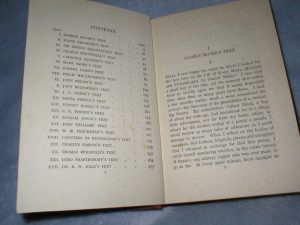
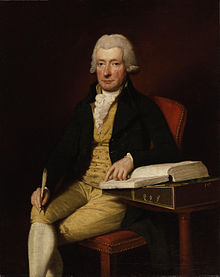
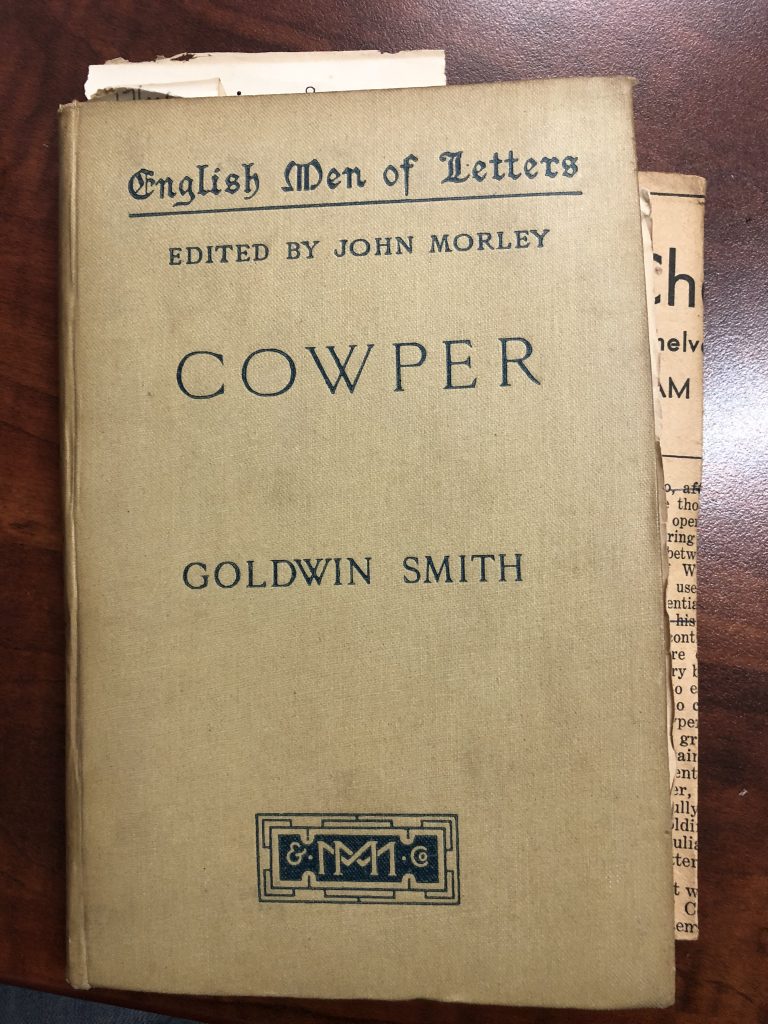
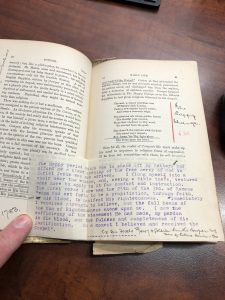
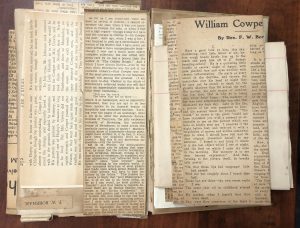
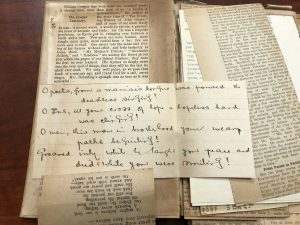
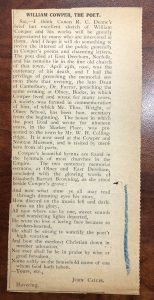
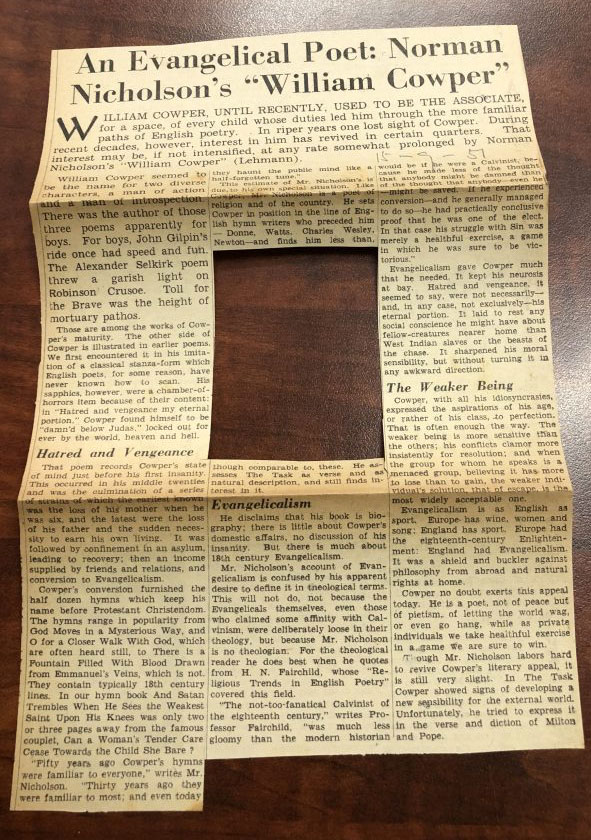
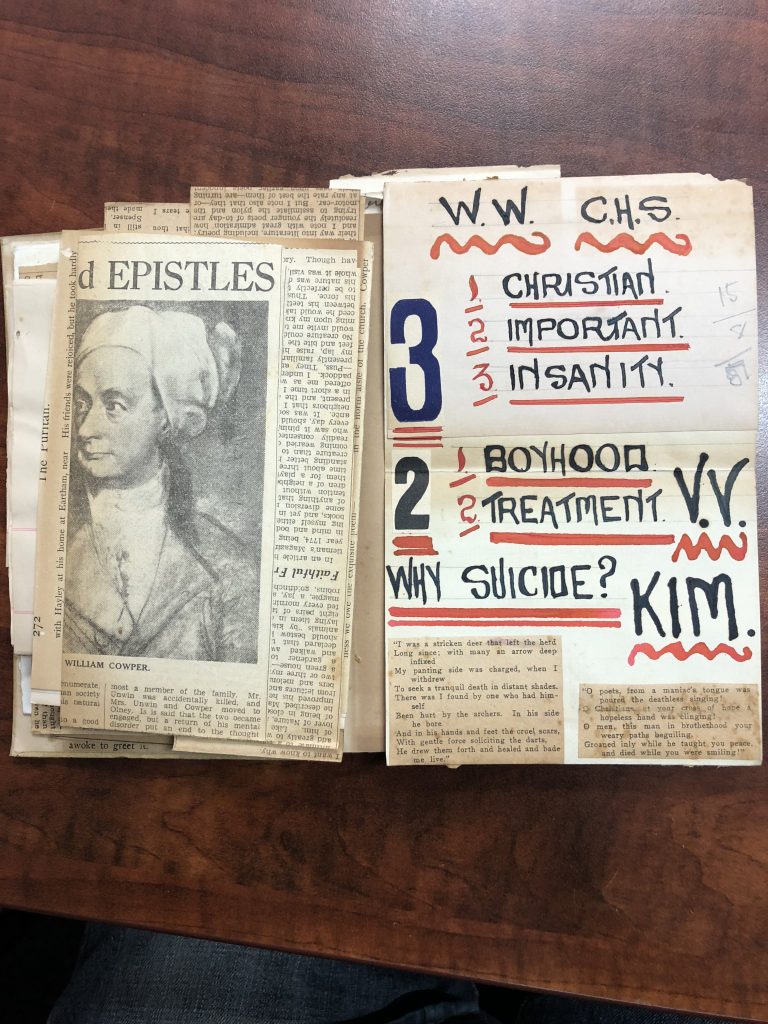















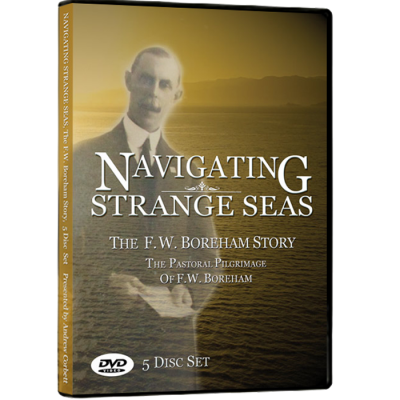
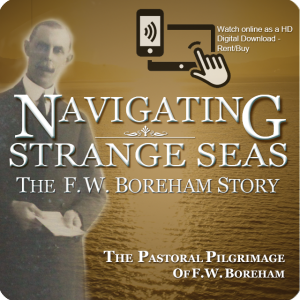
0 Comments